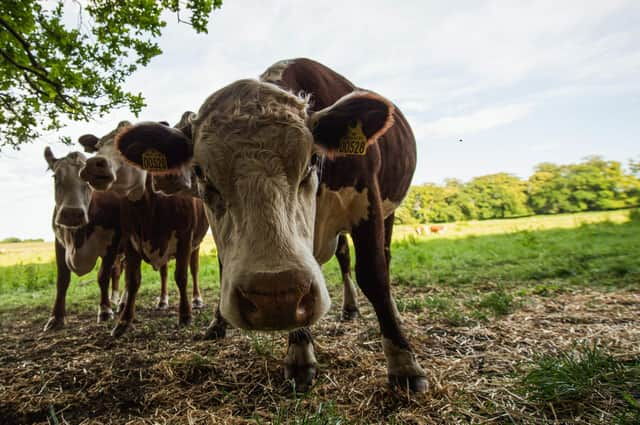Cows’ stomachs may help to tackle plastic waste


But scientists have found that micro-organisms in cows’ stomachs could offer a cheap and environmentally friendly way to break down some of the commonest forms of waste plastic – representing an eco-friendly way of reducing litter.
Plastic is notoriously hard to break down, but researchers in Austria have found that bacteria from a cow’s rumen – one of the four compartments of its stomach – can digest certain types of the ubiquitous material, representing a sustainable way to reduce plastic litter.
Advertisement
Hide AdAdvertisement
Hide AdAnd while individual bugs have been tested to speed decomposition, researchers now believe that a the wide mixture of different micro-organisms and enzymes working together as a community in rumen liquor could be more effective than any one type alone.
The scientists suspected such bacteria might be useful, since cow diets already contain natural plant polyesters.
“A huge microbial community lives in the rumen reticulum and is responsible for the digestion of food in the animals,” said Dr Doris Ribitsch, of the University of Natural Resources and Life Sciences in Vienna,
“So we suspected that some biological activities could also be used for polyester hydrolysis, a type of chemical reaction that results in decomposition.”
These microorganisms can already break down similar materials, so the study authors thought they might be able to break down plastics as well.
Ribitsch and her colleagues looked at three kinds of polyesters. One, polyethylene terephthalate, commonly known as PET, is commonly used in textiles and packaging. The other two consisted of a biodegradable plastic often used in compostable plastic bags (polybutylene adipate terephthalate, PBAT), and a biobased material (Polyethylene furanoate, PEF) made from renewable resources.
They obtained rumen liquid from a slaughterhouse in Austria to acquire the micro-organisms they wanted to use in the tests. They then incubated that liquid with the three types of plastics they were testing (which were tested in both powder and film form) in order to understand how effectively the plastic would break down.
According to results, recently published in Frontiers in Bio-engineering and Biotechnology, all three plastics could be broken down by the micro-organisms from cow stomachs, with the plastic powders breaking down quicker than plastic film.
Advertisement
Hide AdAdvertisement
Hide AdCompared to similar research that has been done on investigating single micro-organisms, Ribitsch and her colleagues found that the rumen liquid was more effective.
While their work has only been done at a lab scale, Ribitsch said that due to the large amount of rumen which accumulates every day in slaughterhouses, upscaling would be easy to imagine – and she said that microbial communities had so far been underexplored as a potential eco-friendly resource.
Comments
Want to join the conversation? Please or to comment on this article.